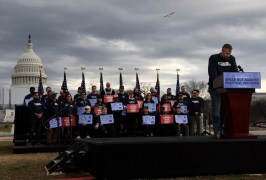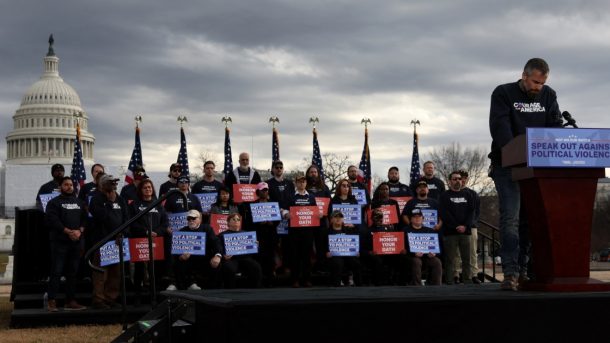
Today marks two years since Americans turned on their televisions to watch something that many thought was impossible—a violent mob attacking the Capitol of the United States with the intention of disrupting the Electoral College vote count. Those days were followed by the creation of a House Select Committee and ten drama filled hearings that began on June 9, 2022 and ended December 19, 2022.
Many expected that the hearings would change public opinion, but on the second anniversary of the January 6 violent invasion of the U.S. Capitol, sentiment remains mostly divided along party lines and has barely budged since the first anniversary of this event. Americans remain split on the issue of whether former president Donald Trump committed crimes related to this event and whether he should be charged, and the dramatic testimony delivered at the public hearings of the Select Committee changed few minds.
During the past year, Quinnipiac University conducted a series of polls probing sentiment about January 6. Concerning the former president’s responsibility for events at the Capitol, here are the results from the beginning, middle, and end of 2022.
TABLE 1: HOW MUCH RESPONSIBILITY DOES DONALD TRUMP BEAR FOR JANUARY 6?
| A lot | Some | Not much | None | |
| January 2022 | 43 | 18 | 16 | 20 |
| June 2022 | 41 | 18 | 14 | 25 |
| December 2022 | 45 | 19 | 13 | 21 |
[Source: Quinnipiac University polls]
Opinion about the seriousness of the January 6 events was also stable. In January 2022, 50% of Americans thought that these events represented an attack on democracy that should never be forgotten, compared to 44% who believed that the country was making too much of these events and that it was time to move on. In December, Americans remained divided on this issue, 54% to 41%.
In July, the NPR/PBS/Marist survey posed the question differently but got similar results. Presented with three different assessments of January 6, 50% of respondents said that it was an insurrection that threatened democracy, 19% regarded it as constitutionally protected political protest, and 25% deemed it unfortunate but believed that it was time to move on.
Public opinion about the seriousness of Donald Trump’s actions related to January 6 showed a similar pattern of division and stability. In June 2022, according to Quinnipiac, 46% of Americans believed that Trump had committed a crime, but 47% disagreed. In July, after several more explosive public hearings, 48% thought that he had committed a crime, compared to 44% who didn’t. By December, sentiment remained unchanged, 47% to 43%.
In late August, a Monmouth University survey found that 41% wanted Trump to be charged with January 6 crimes, 34% did not, and 25% were unsure. There is no evidence that this balance shifted in the final months of 2022. If the Justice Department follows up on the January 6 committee’s criminal referral by charging the former president, the public response is likely to mirror this division.
Beyond the up-or-down legal issues, broader assessments of the former president’s actions on January 6 revealed some cracks in the wall of partisanship that surrounds these events. For example, a CNN survey in July found that 20% of Republicans believed that Trump’s statements had encouraged political violence and that 55% of Republicans did not think that Trump had done everything in his power to stop the violence once it erupted. Fifty-two percent of Republicans felt that Mike Pence had done more than Donald Trump on this fateful day to serve the national interest.
Some days of violence, such as the December 7 attack on Pearl Harbor and the September 11 attack on the Twin Towers and the Pentagon, become symbols of national unity and resolve. The evidence so far suggests that January 6 will not join their ranks. It is more likely that to future generations, the day the U.S. Capitol was stormed will serve as a reminder of the deep political divisions that characterized the current era of American politics.







